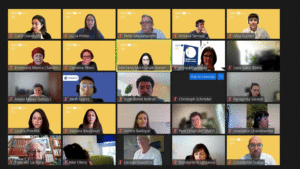
On April 26, 2024, the Mission for Natural Heritage took a step in fostering collaboration by launching the activities of its Working Groups under the Dialogue for Nature project. A diverse gathering of 97 representatives, including project partners, thematic projects, associated partners, and other Interreg Euro-MED governance project members, convened online to shape the joint journey towards a more sustainable future.
The event opened with a shared vision for the four thematic working groups, emphasising the importance of networking, capacity building and knowledge exchange. The overarching guide for these activities is the recent Kunming-Montreal Global Biodiversity Framework (GBF), which paves the way for achieving the Sustainable Development Goals and envisages a harmonious coexistence with nature by 2050. Alongside the GBF, policies like the EU Biodiversity Strategy for 2030 and the Post-2020 Strategic Action Programme for the Conservation of Biodiversity and Sustainable Management of Natural Resources (SAP BIO), will shape the focus and impact of the Working Groups.
Following the initial presentation, attendees were divided into four breakout groups, each dedicated to a specific Working Group, to delve into tailored discussions on themes, priorities and objectives for the year ahead. This collaborative approach set the stage for meaningful engagement and a strong sense of community.
Working Group presentation: WGs 1st Online Meeting- 26_April_2024.pptx
Exploring the Working Groups
Working Group 1 – Area-based Conservation
Led by the International Union for the Conservation of Nature (IUCN), with the support of the Ministry of Ecology, Spatial Planning and Urbanism of Montenegro, and the Association of Parks in Bulgaria, this group zeroes in on Target 1 (Spatial Planning) and Target 3 (Area-based Conservation) of the Global Biodiversity Framework. The focus on Protected Areas (PAs) and Other Effective Area-based Conservation Measures (OECMs) aims to inspire innovative strategies for conservation.
Working Group 2 – Overcoming Local Barriers for Climate Change Adaptation
MedCities spearheads this group, with support from the Region of Crete, the National Technical University of Athens, CREAF, and IrRADIARE. Addressing Target 8 (Climate Change Mitigation and Adaptation) and Target 12 (Nature Cities and Human Health) of the Global Biodiversity Framework, it explores the intersection of climate change and biodiversity in urban and peri-urban contexts, seeking solutions that foster resilience and adaptation.
Working Group 3 – Evaluating the Socio-Economic Value of Biodiversity
The Marine Institute leads this group, collaborating with CoNISMa and the National Institute of Biology of Slovenia. Target 14 (Values for Nature), Target 15 (Business & Biodiversity), Target 18 (Harmful Incentives), and Target 19 (Financial Resources) of the Global Biodiversity Framework guide the exploration of biodiversity’s socio-economic value, focusing on ecosystem services and products, industry and stakeholder values, and alternative conservation scenarios.
Working Group 4 – Ecosystem Restoration and Nature-based Solutions
Plan Bleu takes the helm, with the support of the French Biodiversity Office (OFB), CoNISMa, and the Department of Environment of Cyprus. With Target 2 (Restoration), and Target 11 (Ecosystem Services) of the Global Biodiversity Framework at the forefront, this group emphasises restoring ecosystems and promoting Nature-based Solutions through best practices and knowledge sharing.
The meeting also served as an opportunity to map the needs and expectations of thematic projects and associated partners in terms of policy and advocacy, but also their capacity to support the efforts in advocacy and policy influencing. This insight will fuel ongoing discussions within each Working Group, leading to a second online meeting in October 2024, focusing on restoration. The Working Groups will then gather in person at the end of November for the Annual Institutional Dialogue of the Mission for Natural Heritage to discuss the policy-sciency interface and establish a unified position on marine and coastal restoration.
Although at the moment the Working Groups consist of thematic projects, project partners and associated partners of the Natural Heritage Mission, and other stakeholders from the Interreg Euro-MED environment, there are plans for expansion to include other key stakeholders in the effort to foster broader collaboration and impact.
The launch of the Working Groups marks a significant step in the Mission for Natural Heritage’s efforts to create meaningful dialogue and collaboration to influence the policy arena by providing concrete upscalable results.
For specific information on each group, you can reach out to the following focal points:
- Working Group 1 on Area-based Conservation: IUCN – Carla Danelutti (Carla.DANELUTTI@iucn.org) and Lucía Prieto (lucia.prieto@iucn.org)
- Working Group 2 on Overcoming Local Barriers for Climate Change Adaptation: MedCities – Carolina Pérez (cperezv@medcities.org) and Alba Guitart (aguitart@medcities.org)
- Working Group 3 on Evaluating the Socio-Economic Value of Biodiversity: Marine Institute – Peter Mackelworth (peter.mackelworth@blue-world.org) and Henrieta Belegisanin (henrieta.belegisanin@marineinstitute.eu)
- Working Group 4 on Ecosystem Restoration and Nature-based Solutions: Play Bleu – Arnaud Terrisse (aterrisse@planbleu.org) and Constantin Tsakas (ctsakas@planbleu.org)

